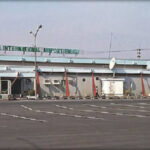The All Progressives Congress (APC) says welfare of workers is a cardinal policy of the President Muhammadu Buhari-led administration.
According to Pulse, the APC National Publicity Secretary, Malam Lanre Issa-Onilu stated this on Monday, December 17, 2018, while reacting to the four-day warning strike embarked upon by the National Assembly workers which resulted to shutdown of the legislative complex.
He described the development as shameful and called on the Peoples Democratic Party (PDP)-led National Assembly to save the country from the national embarrassment.
He specifically called on the Senate President, Sen. Bukola Saraki, and the Speaker of the House of Representatives, Yakubu Dogara, to do the needful by attending to the demands of the parliamentary workers.
He noted that the development was a sad reminder of what Nigerians witnessed under the PDP administration. He said:
“The PDP’s 16-year rule was characterized by such incidences of unpaid salaries, ghost workers and a shocking disdain for workers’ welfare.”
The Spokesman noted that while the minority PDP usurpers who paraded themselves as NASS leadership promptly paid themselves their allowances, workers under the umbrella of Parliamentary Staff Association of Nigeria (PASAN) were being owed.
He said that the PASAN workers were owed their duly earned 28 percent increase in their salaries since 2010.
He said perhaps, if the National Assembly leaders had focused on their core legislative business and operations rather than resort to subterfuge with the intent to undermine the APC government, the welfare of parliamentary workers would not have been taken for granted.
He recalled that the President Buhari-led administration in one of its first actions, approved federal government bailouts to states to settle salaries owed workers.
This, he said, was the stuff of people-centered governance which the APC represented, stressing that a worker deserved his wages.
He said the APC had now learnt that the parliamentary workers had blocked all entrances into the National Assembly complex and cut off essential services such as power and water supply; effectively crippling any form of activity within the premises.





![Two African Cardinals Among 15 Possible Replacements For Pope Francis [Full List] 5 Two African Cardinals Among 15 Possible Replacements For Pope Francis [Full List]](https://media.kanyidaily.com/2025/04/21181630/Successors-To-Pope-Francis-1-150x150.jpg)

![Christians Hold Peace Walk To Honour Victims Of Plateau Killings [Video] 9 Christians Hold Peace Walk To Honour Victims Of Plateau Killings [Video]](https://media.kanyidaily.com/2025/04/21154705/All-Videos-Edit.05_46_52_07.Still2694-1-1536x864-1-150x150.jpg)








